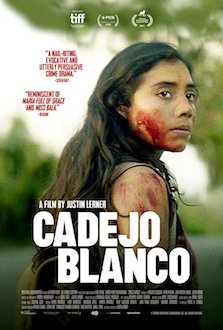Direction: Justin Lerner
Country: Guatemala / Mexico / other
Cadejo Blanco works more or less in the way it's supposed to, but in its grave meditation on the banality of evil and gang insensitivity, it reflects excessive mechanical behaviors. I felt a bit detached because the narrative was never stimulating.
The story revolves around the disappearance of a teenager who never returned home after a night out in Guatemala City. Sarita (Karen Martínez), the missing girl’s courageous sister, is certain that her disappearance is related to Andrés (Rudy Rodriguez), a gang boy who was dating her. Through him, she manages to infiltrate the gang in the coastal town of Puerto Barrios in order to get some answers. Yet, the acts of violence she’s forced to commit and the oppression she endures will change her life forever.
Wallowing in the mire of an innocent infiltrated that seeks revenge, the film displays a simple, adequate scenario, but the episodes are not quite believable. Martínez reveals excessive emotional control and a chilly coldness when acting. Although she might not be worthy of our sympathy, it’s not just revenge she’s eager for but also survival that is in question.
It’s easy to say that writer-director Justin Lerner - this is his third feature, following Girlfriend (2010) and The Automatic Hate (2015) - and the pair of young actors showed dedication to the material, but it’s unfortunate that the tactlessness of most of the scenes hinders the final product.








